According to the mediaeval pseudo-historian Geoffrey of Monmouth the Britons (the ancestors of the modern Welsh) were the first people to inhabit the British Isles.
"she stretcheth forth as it were three arms whereby she taketh in the traffic from oversea brought hither from every land in her fleets. By twice ten cities, moreover, and twice four, was she graced in days of old, whereof some with shattered walls in desolate places be now fallen into decay, whilst some, still whole, do contain churches of the saints with towers builded wondrous fair on high, wherein companies of religious, both men and women, do their service unto God after the traditions of the Christian faith. Lastly, it is inhabited of five peoples, Romans, to wit, Britons, Saxons, Picts and Scots. Of these the Britons did first settle them therein from sea to sea before the others, until, by reason of their pride, divine vengeance did overtake them, and they yielded them unto the Picts and Saxons. Remaineth now for me to tell from whence they came and in what wise they did land upon our shores, as by way of foretaste of that which shall hereafter be related more at large."
Ptolemy's map of the British Isles 
However by the 13th century the light of British independence was extinguished by King Edward I (Longshanks) in 1282 with the death of it's last ruler Llewellyn Ap Gruffydd
The Killing of Llewellyn 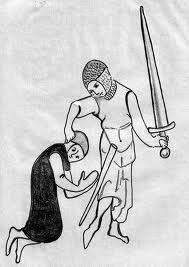
And his monument
Here began the oppression of the Welsh people that did not end until completely until 1992 with the Welsh language Act which gave Welsh (the aboriginal language of Britain) official status, and ironically giving it De Jure the status of the only "official" language in the UK.
After the rebellion of Owain Glyndwr in the early 15th Century, there were tough penal laws enacted against the Welsh
" These laws banned the Welsh from obtaining senior public office, the bearing of arms or buying property in English towns. All public assembly was forbidden, and education of Welsh children was restricted. Englishmen who married Welsh women also came under these laws."
Owain Glyndwr
These tough penal laws affected the Welsh people terribly, however the Welsh language and Welsh law was allowed to carry on, and the Welsh themselves could be said to live on "reservations" rather akin to the Native Americans or a type of apartheid.
In 1485 Henry Tudor who was Welsh born (Henry VII) who adopted the red dragon of Cadwalldr
His victory was seen by the Welsh as a promise of the return of King Arthur to drive the Saxon out and restore Britain to it's original inhabitants, and Henry named his eldest son "Arthur" however Arthur died and his elder brother took his place and it was his "Laws in Wales" Acts of parliament of 1535 and 1542 that ended the Welsh law and banned the Welsh language from government, putting another nail in the coffin of Welsh identity
Copy of the 1542 Laws in Wales Act
""Also be it enacted by the Authority aforesaid,
That all Justices, Commissioners, Sheriffs, Coroners, Escheators, Stewards, and their Lieutenants, and all other Officers and Ministers of the Law, shall proclaim and keep the Sessions Courts Hundreds Leets Sheriffs Courts, and all other Courts in the English Tongue;
and all Oaths of Officers, Juries and Inquests, and all other Affidavits, Verdicts and Wager of Law, to be given and done in the English Tongue;
and also that from henceforth no Person or Persons that use the Welch Speech or Language, shall have or enjoy any manner Office or Fees within this Realm of England, Wales, or other the King's Dominion, upon Pain of forfeiting the same Offices or Fees, unless he or they use and exercise the English Speech or Language."
This act led to the angliseation of the Welsh ruling class and a further marginalization of the Welsh people.
Wales was losing it's identity as a nation and becoming in the words of Basil Jones (Bishop of St David's) a "geographical expression"
This situation became worse in 1847 when an enquiry was launched into state of education in Wales, that became known in Wales "the treachery of the Blue Books" because of its criticism of the Welsh language and encouraged it's disuse. 
With such extreme measures including what became known as the "Welsh Not" 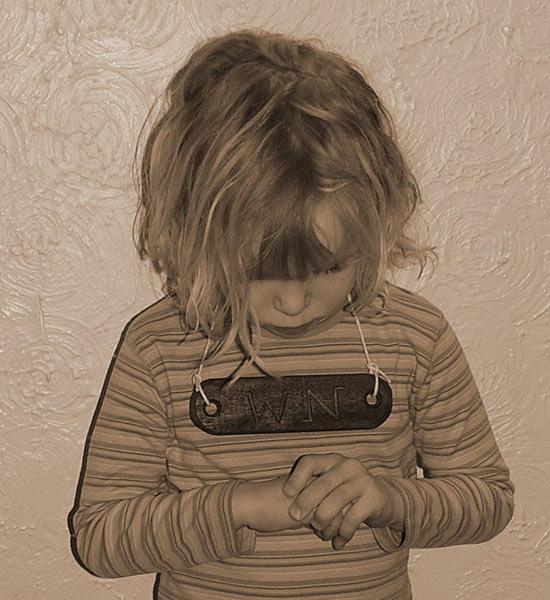
Children who were caught speaking Welsh would have this put on until at the end of the day the child to be caught speaking Welsh would be beaten. Essentially Welsh was to be beaten out of the people.
However at the end of the 19th Century there was renewal of the Welsh identity when a group known as Cymru Fydd (Young Wales) led a revival of both the Welsh language it was led by David Lloyd George.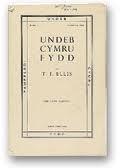

In addition, the establishment of the Welsh National Party (Plaid Cymru) and the Welsh League of Youth. With its aims to revive the Welsh language.
In 1966 The Welsh National party led by Gwynfor Evans
Captured its first parliamentary seat and his victory began the march to self-government and the revival of Welsh. The year after his victory The 1967 Welsh language act repealed the anti-Welsh provisions of 1535 and 1542 Laws in Wales's acts. On top of that, Welsh medium schools were established, along with Welsh language programs on TV and radio
Miri Mawr (great fun) a popular Welsh language show for Children 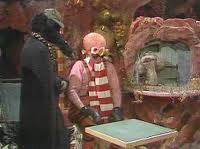

In the 1980s the Thatcher government had decided to shelve the proposed Welsh 4th channel they changed this after Gwynfor Evans threaten to fast to death> Evans was prepared to die over the status of the Welsh language in the media and he won
Gwynfor preparing for his hunger strike
This victory did 2 things it led to the 1993 Welsh language act which made Welsh the official language of Wales (and the only one in the UK) and it made home rule for Wales possible which resulted in the new National Assembly for Wales being established and Wales finally being a nation again for the first time since the 13th Century and again Securing a strong place for the Welsh language.
National Assembly for Wales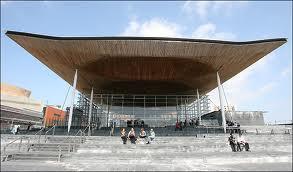


No comments:
Post a Comment